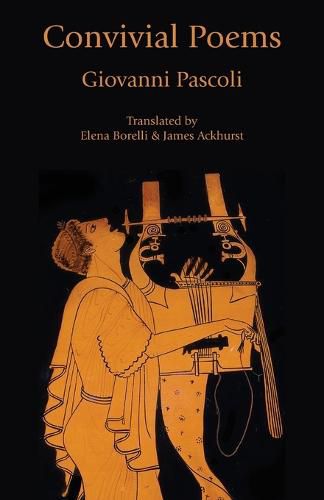Readings Newsletter
Become a Readings Member to make your shopping experience even easier.
Sign in or sign up for free!
You’re not far away from qualifying for FREE standard shipping within Australia
You’ve qualified for FREE standard shipping within Australia
The cart is loading…






This title is printed to order. This book may have been self-published. If so, we cannot guarantee the quality of the content. In the main most books will have gone through the editing process however some may not. We therefore suggest that you be aware of this before ordering this book. If in doubt check either the author or publisher’s details as we are unable to accept any returns unless they are faulty. Please contact us if you have any questions.
Giovanni Pascoli (1855-1912) is renowned as one of the founders of modern Italian poetry. Embodying the Zeitgeist of fin-de-siecle Italy, his works are inspired by French Symbolism and Decadentism. They also draw on the classical tradition so alive in Italian culture. His unique poetic voice is filled with traditional metrical forms, an uncanny use of onomatopoeic language, and a multilingual vocabulary. He fills his depiction of nature with haunting images and a disquieting sensitivity.
Convivial Poems (Poemi Conviviali) is named for Il Convito, the literary journal where these poems first appeared. The collection represents one of Pascoli’s highest achievements. Like T.S. Eliot’s The Waste Land, James Joyce’s Ulysses, and contemporary post-modernist works, it revisits the classical world to draw new symbols for the modern condition.
Convivial Poems consists of twenty poems, with facing Italian and English, each devoted to a classical figure, fictional or historical. Ulysses, Helen of Troy, and Alexander the Great, among others, are the protagonists of these stories, but they are also signifiers for themes such as desire and the quest for identity in a modern universe deprived of God. Exquisitely written in a language that at times replicates the forms of Latin and Greek, these poems encode the past into the present and blend the old and the new in a vibrant modernist style.
$9.00 standard shipping within Australia
FREE standard shipping within Australia for orders over $100.00
Express & International shipping calculated at checkout
This title is printed to order. This book may have been self-published. If so, we cannot guarantee the quality of the content. In the main most books will have gone through the editing process however some may not. We therefore suggest that you be aware of this before ordering this book. If in doubt check either the author or publisher’s details as we are unable to accept any returns unless they are faulty. Please contact us if you have any questions.
Giovanni Pascoli (1855-1912) is renowned as one of the founders of modern Italian poetry. Embodying the Zeitgeist of fin-de-siecle Italy, his works are inspired by French Symbolism and Decadentism. They also draw on the classical tradition so alive in Italian culture. His unique poetic voice is filled with traditional metrical forms, an uncanny use of onomatopoeic language, and a multilingual vocabulary. He fills his depiction of nature with haunting images and a disquieting sensitivity.
Convivial Poems (Poemi Conviviali) is named for Il Convito, the literary journal where these poems first appeared. The collection represents one of Pascoli’s highest achievements. Like T.S. Eliot’s The Waste Land, James Joyce’s Ulysses, and contemporary post-modernist works, it revisits the classical world to draw new symbols for the modern condition.
Convivial Poems consists of twenty poems, with facing Italian and English, each devoted to a classical figure, fictional or historical. Ulysses, Helen of Troy, and Alexander the Great, among others, are the protagonists of these stories, but they are also signifiers for themes such as desire and the quest for identity in a modern universe deprived of God. Exquisitely written in a language that at times replicates the forms of Latin and Greek, these poems encode the past into the present and blend the old and the new in a vibrant modernist style.